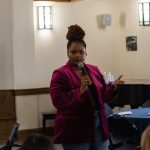SHAWN OLSTEIN ’22
CONTRIBUTING WRITER
This Wednesday, Oct. 17, the Connecticut Supreme Court will hear two cases, one criminal and one civil, on the second floor of Mather Hall in the Washington Room. This program, brought to Trinity by the efforts of faculty and students, is sponsored by the Public Policy and Law Department, the Political Science Department, the Pre-Law Society, and the Mock Trial Team. The first will begin at 10:00 a.m. with the second scheduled to begin at 11:30 a.m. Interested students should arrive at 9:30 a.m. for the first argument and at 11:00 a.m. for the second argument.
This is a part of the Connecticut Supreme Court’s “On Circuit” program, where the court selects a location other than the Supreme Court building for arguments to be heard. This program was first established in 1986 with the goal of giving students and members of the public the opportunity to observe oral argument in appellate cases. According to the State of Connecticut Judicial Branch’s website, the goal of the program is “to educate students and residents of the state about the role and responsibilities of the appellate system.”
Two of the justices, Richard Palmer ‘72 and Christine Vertefeuille ‘72, are both alumni of Trinity, and have expressed their excitement at returning to campus to the Tripod in a feature’s interview this week. In a press release from the Judiciary Department, Trinity College President and Professor of Neuroscience Joanne Berger-Sweeney added that “it is an honor for our campus community to host the ‘On Circuit’ program” and added that she is “proud to count distinguished Justices Palmer and Vertefeuille among our alumni.” Berger-Sweeney continued, adding that she “thank[s] them for the tremendous example they set for our students every day.” Chief Justice Richard A. Robinson, in the same press release, added that “Trinity has been a gracious and welcoming host” and that he “fully expect[s] [that] this real-life opportunity to see the Supreme Court in action will be an invaluable experience for students.”
The first case, State of Connecticut v. Jean Jacques, is a criminal case over wrongful search as seizure. According to the case brief, accessible through the Court‘s website, the premise of the case concerns an event on June 15, 2015. Less than a week after entering a monthly lease on an apartment in Norwich, the Defendant was arrested on a drug charge, and a week later he was charged with murder. The Defendant’s cellmate informed the police that the Defendant had told him that after he stabbed the murder victim, he took some drugs and a cell phone from the victim and hid them in a hole in the wall of the apartment he had recently rented. The police performed a warrantless search of the apartment and found the hole with the drugs and cell phone. Thereafter, once they had received a warrant, they returned to retrieve the items. When the police first searched the apartment, the Defendants lease had expired. The Defendant contends in this case that the cell phone and drugs should be inadmissible as evidence in his murder trial as they were found in what the Defendant portends to have been an illegal search and seizure.
The second case, Austin Haughwout v. Laura Tordenti et al., concerns a claimed violation of freedom of speech as a factor in a student’s expulsion from Central Connecticut State University. According to the case brief, accessible through the Court’s website, the Plaintiff seeks to be reinstated as a student at the college. The college expelled him over reports that he made hand gestures as if he was aiming a gun and shooting at other students, wondered aloud how many rounds he would need to shoot people at the school, mentioned that he had bullets at his home and in his vehicle, showed pictures of guns he owned to fellow students, and bragged about bringing a gun to school. The Defendant also named a particular student as his “number one target,” made reference to a shooting at an Oregon community college, and stated during a testing of the school’s alarm system that “someone should really shoot up the school for real so it’s not a drill.” The brief also noted that “the trial court rendered judgment for the Defendants, concluding that the Plaintiff failed to prove that his free speech rights were violated.” The Plaintiff argues that these were jokes and a form of political commentary and, therefore, should be considered protected speech.
Both cases will be heard on the same day, after which the litigators will participate in a question-and-answer session with students. The question-and-answer session for the first case will begin at 11:00 a.m. and the second session will begin at 12:30 p.m. Students interested in attending the event should refrain from bringing water bottles or backpacks, as the event includes security and bags will be searched.




+ There are no comments
Add yours